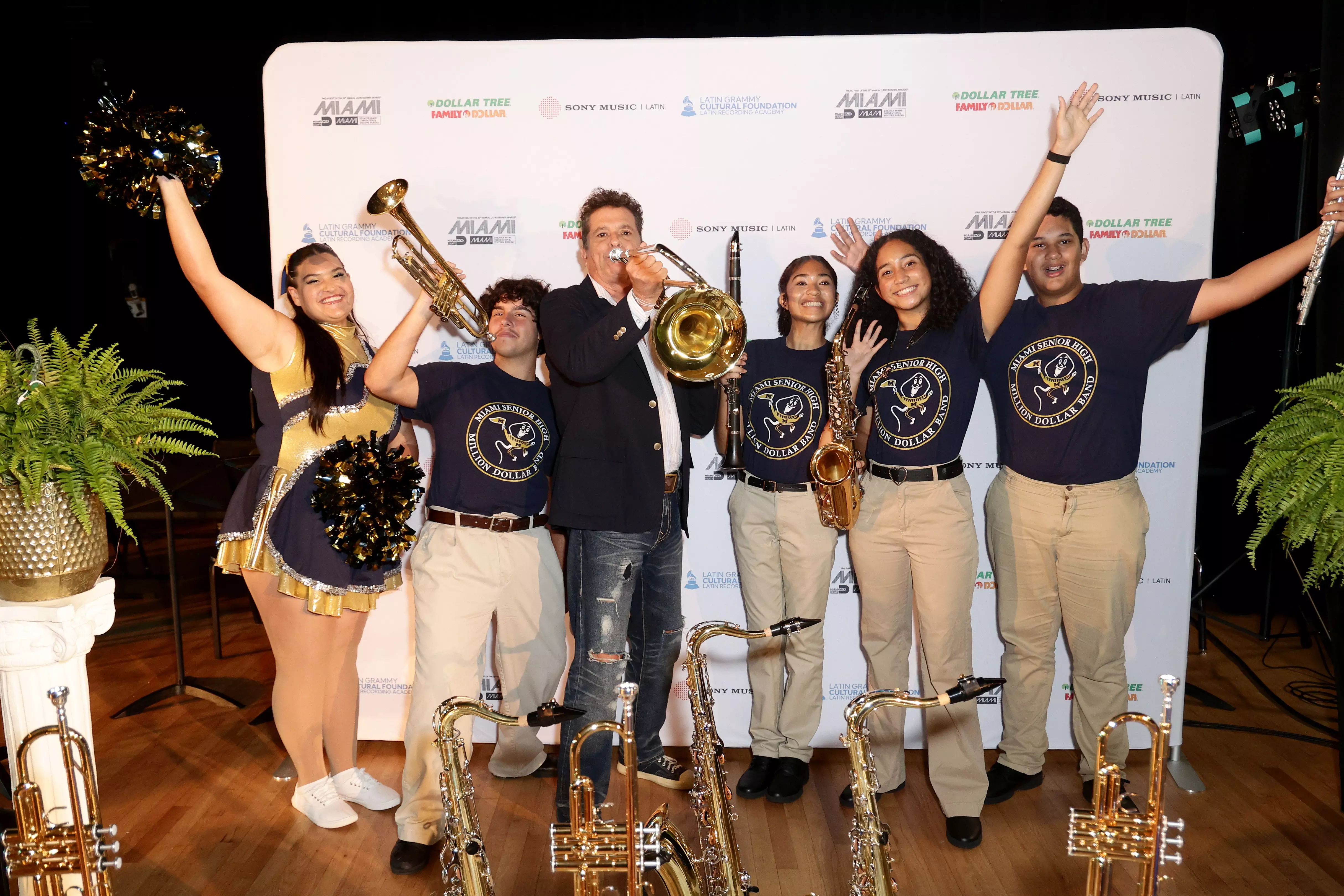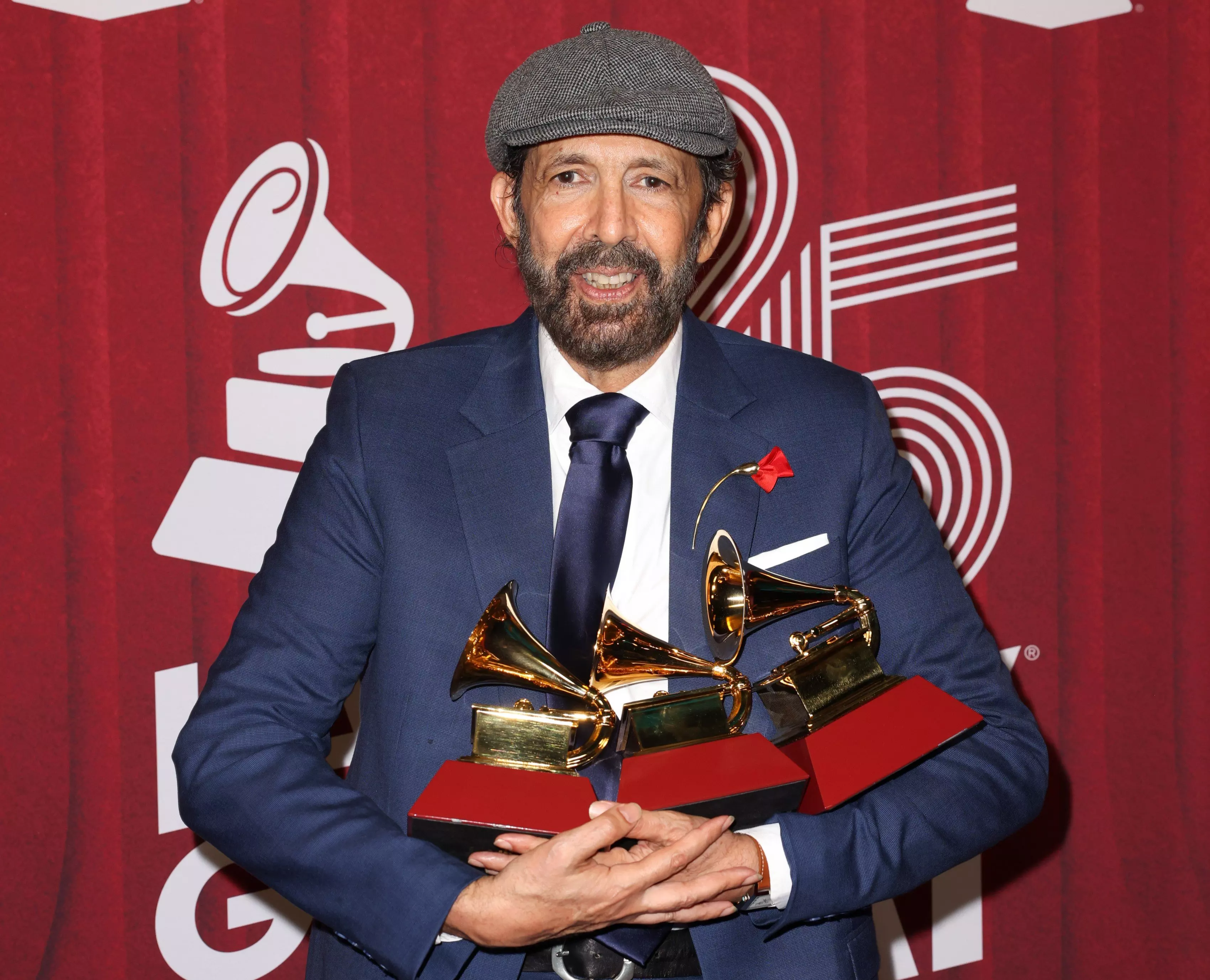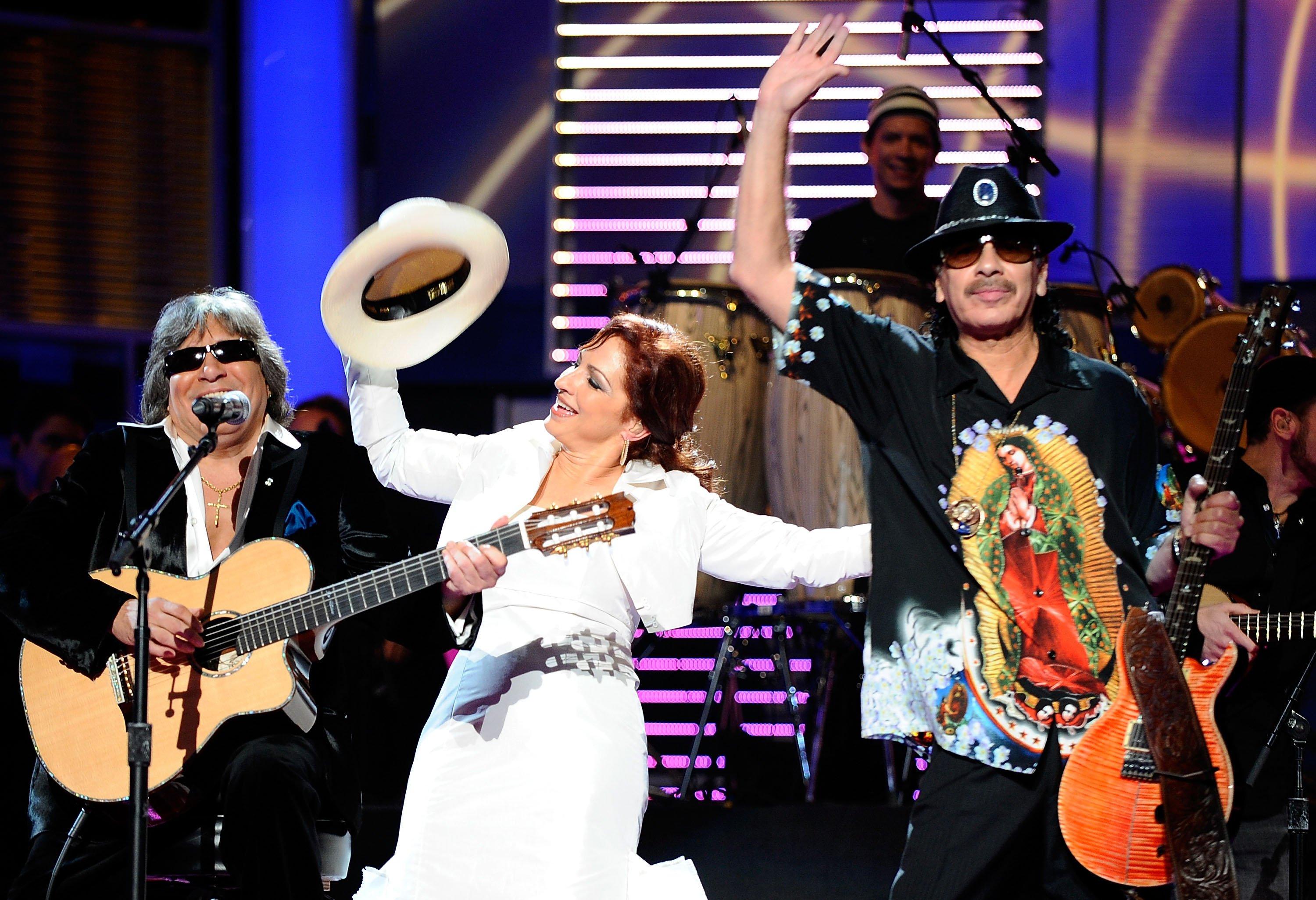Photo: Jeff Kravitz / FilmMagic / Getty Images

list
Every Year Is The Year Of Shakira: 10 Songs That Prove She's Always Been A Superstar
Between smash hits, museum exhibits and Latin GRAMMY wins, 2023 proved to be Shakira's big year. But a cruise through the icon's discography proves that Shakira has long been a timeless artist with a boundless aesthetic universe.
Was 2023 the year of Shakira?
At 46, she released some of the most intriguing and successful singles of her career: "El Jefe," with música mexicana sensation Fuerza Regida, "TQG," with fellow Colombian KAROL G, and an already classic Bizarrap session that may well be the best revenge song of the past 50 years. In November she collected three Latin GRAMMY awards and, in March, the GRAMMY Museum opened an exhibit focusing on her music.
As she readies the release of her twelfth studio album and an accompanying world tour, GRAMMY.com looks back at her discography. These 10 tracks — a mix of anthemic mega-hits and lesser-known gems — prove that while 2023 may have been Shaki's big year, she's always been a star.
"Antología" (1995)
Culled from her breakthrough third album Pies Descalzos, the lilting "Antología" remains one of her biggest hits.
Even though she would go on to experiment with every genre under the sun — from merengue and bhangra to reggaetón — Shakira always emphasized solid songwriting as the main ingredient of her craft. A bouncy ballad with an unassuming chord progression, it leaves plenty of space for her passionate vocalizing to shine through.
"Ojos Así" (1998)
The apocalyptic closing track of Dónde Están Los Ladrones? —basically, a rock album — "Ojos Así'' revealed a reality that wasn’t obvious back in the late ‘90s: Shakira was no ordinary pop star.
A tribute to her Lebanese roots with subtle echoes of Led Zeppelin’s "Kashmir," the song fused Arabic folk and rock. She beamed and belly danced on stage while performing the song, captivating a generation of concertgoers.
"La Tortura" (2005)
The Oral Fixation/Fijación Oral album diptych signaled Shakira’s creative growth and global star status. No other song summed up this moment of artistic exuberance like "La Tortura" — a pop smash that transcends the limitations of the genre.
A duet with the gruff voice of Spanish balladeer Alejandro Sanz, "La Tortura" combines quotable lyrics with a reggaetón backbeat, EDM textures and accordion riffs — the perfect marriage of digital slickness and analog warmth.
"Gypsy" (2009)
Look beyond the hits and you will find a treasure trove of deep cuts in Shakira’s discography. Culled from She Wolf — her eighth LP — "Gypsy" finds its inspiration in Indian bhangra music, with spidery lines of sitar and hypnotic tabla rhythms. Of note: whenever she explores regional genres outside her own culture, Shakira’s respectful approach results in tracks that preserve the style’s roots.
"Loca" (2010)
What did Shakira do when she decided to tackle a merengue? Well, naturally, she flew to the Dominican Republic and spent some time working with authentic merenguero El Cata at his unassuming recording studio.
Included in the life-affirming Sale El Sol LP — one of her best — "Loca" brims with staccato piano lines, fun electro accents and the diva’s sassy delivery.
"Islands" (2010)
Shakira’s ethereal cover of British band the xx’s "Islands" was a pivotal moment for her reputation as a tastemaker. In interviews, she often expressed a deep affinity for mainstream rock'n'roll, naming Led Zeppelin and Queen as some of her favorite artists. But until this moment, no one could have suspected that she also kept up with the best of British indie rock.
Her decision to cover a song by critical darlings the xx demonstrates what a sophisticated listener she is. This dazzling version also showcases her impeccable taste in terms of the track’s arrangement and the specificity of its mood.
"Empire" (2014)
The singer had always shown a proclivity for lush sonics. This epic tour de force — from her self-titled 2014 album — took her sumptuous tendencies to a different level.
A cinematic ballad tailor-made for the exquisite vulnerability and command of her voice, "Empire" implies that Shakira’s reputation as a "pop star" is only a fragment of her artistic identity. She can also sound downright operatic when the mood strikes.
"Me Enamoré" (2017)
The beauty of autobiographical love songs is that the purity of those initial feelings remains frozen in time — regardless of the relationship’s outcome.
A chronicle about meeting her then-partner and the father of her children, soccer star Gerard Piqué, "Me Enamoré" struck a chord for the way it captured the butterflies-in-the-stomach giddiness of falling head over heels in love. A window into her emotional world, it also shows how witty and funny she can be in the lyrics department.
"Chantaje" (2017)
If "La Tortura" introduced Shakira as one of the first mainstream artists to flirt with reggaetón, this duet with Colombia’s Maluma operates in full progressive urbano mode.
Quick to absorb the influences that evolve around her, she sounds right at home in the jagged bounce of the rhythm track, trading seduction barbs like a seasoned reggaetonera. Shakira seems to love infectious dance music, and the urbano cosmovision is a perfect match for her pop sensibility.
"Bzarp Music Sessions, Vol. 53" (2023)
This infamous viral session by the Argentine producer signified a step forward for both artists. It provided Bizarrap with a larger-than-life arena where he could show off the addictive beats that he had been cooking up for years in his home studio. It also confirmed Shakira as the kind of timeless artist who fits seamlessly in the aesthetic universe of a 24 year-old wunderkind.
The lyrics, quoted gleefully by the entire planet throughout 2023, illustrated the genius of Shakira — and how she managed to turn heartbreak into both material riches and emotional payback.

Photo: Getty Images for The Latin Recording Academy
list
10 Meaningful Moments From The 2024 Latin GRAMMYs: Karol G's Heartfelt Speech, Tributes To Late Legends & More
The 25th anniversary of the Latin GRAMMYs was a celebration indeed, spotlighting contemporary stars like Carín León and Anitta while paying homage to veterans like Carlos Vives and Juan Luis Guerra who have paved the way. Revisit 10 highlights here.
One would have expected plenty of pomp and circumstance as the Latin GRAMMYs celebrated their 25th year anniversary. But there were no lengthy speeches or self-congratulatory videos during the Nov. 14 telecast.
This year, the telecast focused on the things that matter: saluting the magic of undying genres like salsa, rock and bossa nova. Honoring the legacies of such Latin American trendsetters as Carlos Vives and Juan Luis Guerra. Giving artists a carefully curated space where to showcase their craft and inspiration.
From the stark cinematic moods of reggaetón to the healing warmth of Afro-Caribbean roots and the bold expansion of música mexicana, here are 10 of the most exciting celebratory moments from the 2024 Latin GRAMMYs.
The Music Of Carlos Vives Is A Priceless Cultural Treasure
Colombian singer/songwriter Carlos Vives was The Latin Recording Academy's 2024 Person Of The Year — a fitting recognition to his groundbreaking fusion of the accordion-heavy vallenato music of his land with rock, pop and even reggae. Vives' path of innovation began with the 1993 album Clásicos de la Provincia, and, like the Latin GRAMMYs, his career has evolved much over the last 25 years.
The singer kicked off the telecast with a career-spanning medley of hits such as "Fruta Fresca" — a rollicking gem off his 1999 classic El Amor de mi Tierra — and the more recent "La Bicicleta." At the end of his performance, he was joined by an enthusiastic group of fellow singers, including Juanes and Camilo. This brisk summary of his creative genius underscored his innate ability to connect with the essence of Latin American culture.
Read More: Watch: Carlos Vives Performs "La Bicicleta," "Robarte Un Beso" & More At The 2024 Latin GRAMMYs
The Moody Soundscapes Of Urbano Continue To Expand
Jagged regaetón beats and ominous trap atmospherics are a natural component of the Latin pop DNA. But the urbano universe continues to grow, experimenting with novel song structures while incorporating references to other genres.
Early on in the telecast, three contemporary stars joined forces for a segment that showcased the ever evolving side of urbano. Eladio Carrión ("Mama's Boy") Quevedo ("Columbia") and Myke Towers ("La Falda") combined their proven commercial appeal with a sophisticated vision.
A True Master Never Stops Learning His Craft
Let's just say that this year's ceremony was a memorable evening for perennial Latin GRAMMY favorite Juan Luis Guerra. The 67-year-old singer/songwriter won the coveted Record Of The Year and Album Of The Year awards, and cherished his Dominican roots in his acceptance speech.
But Guerra also let the music speak for itself in a mesmerizing performance of Record Of The Year winning track "MAMBO 23." A stunning display of craftsmanship, it begins with a dembow beat, incorporates electronic loops, and also switches between the haunting qualities of spiraling bachata lines and the raucous party vibe of traditional merengue — all within the same song. Clearly, Guerra continues to learn and further refine his musical lexicon with each new project.
Read More: Juan Luis Guerra Sweeps The 2024 Latin GRAMMYs With 'Radio Güira'
Three Mexican Legends Are Sorely Missed
Alejandro Fernández | Photo: Getty Images for The Latin Recording Academy
There was a reflective quality to this year's telecast, which included tributes to classic genres and luminaries of the past. Perhaps the most poignant, though, was the segment dedicated to three late giants of Mexican music: Juan Gabriel, José José and Vicente Fernández.
The delicate sadness of Juan Gabriel's "Hasta Que Te Conocí" (performed by Reik and Leonel García), the apocalyptic balada pathos of José José's "El Triste" as a duet (a duet with Carlos Rivera and David Bisbal), and the unapologetic joy of Vicente Fernández's "No Me Sé Rajar" (fittingly, by his son Alejandro) — illustrated the monumental sway that these masters still hold in the Latin music zeitgeist.
Salsa Lives On — And It Grooves Like Crazy
While it is true that the heyday of salsa took place during the '70s and '80s, this is a genre that simply refuses to grow stale. And to prove it, a parade of stars delivered a dazzling tribute to the tenets of salsa fever.
Venezuela's Oscar D'León offered a swinging reading of his 1974 classic "Llorarás," while Colombia's Grupo Niche had the audience chanting along to the chorus of "Una Aventura." Tito Nieves and young stars Luis Figueroa and Christian Alicea were also present, while the salsa romántica royalty of Marc Anthony and La India revived their '90s mega-hit "Vivir Lo Nuestro" in stunning, dynamic form.
Latin Pop Thrives On Emotional Connection
After winning three Latin GRAMMYs last year on the strength of the genre defining Mañana Será Bonito — including the coveted Album Of The Year — KAROL G added another award to her collection on the 2024 telecast. The Colombian star's eclectic 2023 mixtape, Mañana Será Bonito (Bichota Season), won in the Best Urban Music Album category, at a moment when KAROL G is celebrated as one of the world's biggest pop stars.
As she collected the Latin GRAMMY, she focused on the things that matter. "This is about the love that I share with my fans," said a visibly moved KAROL. "And my family, which makes my life so much easier. Without them, I wouldn't have my mental health." The same feeling of emotional openness permeates the songs in both Mañana Será Bonito projects.
This Is Not Your Parents' Música Mexicana
It is definitely not a coincidence that música mexicana is experiencing a massive wave of popularity. The charisma and musical talent of stars like Peso Pluma, Grupo Frontera and Fuerza Régida is augmented by the vision of innovators such as Carín León, who blends effortlessly the folk roots of his native Sonora with cool touches of country and blues.
Introduced by Julieta Venegas and Mon Laferte, León performed "Despídase Bien" — the ending track of his extraordinary 2024 album, Boca Chueca, Vol. 1 — backed by a full band and choir. A thorny electric guitar solo and rousing gospel vocals added gravitas to a song that is Mexican to the core, but does not hesitate to venture out of the box in search of true emotion.
The Old Bossa Nova Classics Are Indestructible
There were no sassy baile funk riddims when Brazilian stars Anitta and Tiago Iorc joined forces for a couple of songs in a dimly lit section of the stage. Instead, the duo launched into a fragile, understated version of Anitta's "Mil Veces," backed only by acoustic guitar and the diva's gorgeous voice.
This intimate moment was followed by "Mas Que Nada" — the whimsical 1963 tune by Jorge Ben that turned Sérgio Mendes and his band Brasil '66 into one of the architects of the bossa nova movement. Mendes passed away in September of this year, and the luminous interpretation by Anitta and Iorc served as the most elegant tribute possible.
Visceral Rock n Roll Will Never Go Out Of Style
One of the most intense moments of the telecast lasted less than two minutes — but will stay in the mind of anyone who ever prophesied the death of rock.
Hailing from Monterrey, Mexico, The Warning — a trio made up by sisters Daniela, Alejandra and Paulina Villarreal Vélez — delivered a welcome jolt of rock 'n'roll with a ferocious version of their hit "Qué Más Quieres." The performance was a reminder of how much raucous fun a trio of guitar, bass, drums, and gutsy vocals can generate. And yes, Latin rock is in excellent health, thank you.
Read More: Watch: The Warning Bring Hard Rock Power To The 2024 Latin GRAMMYs With "Qué Más Quieres"
At The End Of The Day, It's All About The Songs
As is often the case with Latin GRAMMY darling Jorge Drexler, the Uruguayan troubadour had some deep thoughts to share when he received the Song Of The Year honor for the exquisite "Derrumbe" — a non-album single he released in February of this year.
"This is madness," Drexler said after exchanging a hug with Juanes, who announced the winner. He pointed out that he hails from a very small country, and that "Derrumbe" itself was a sad and short song — una cancioncita, he called it.
He thanked the Latin Recording Academy for healing his chronic imposter syndrome and proving that a delicate, unassuming tune like his could win. Then again, that's one of the main missions of the Latin GRAMMYs: to acknowledge the power of a great song to inspire and transform.
Latest In Latin Music, News & Videos

10 Meaningful Moments From The 2024 Latin GRAMMYs: Karol G's Heartfelt Speech, Tributes To Late Legends & More

Behind The Scenes At Latin GRAMMY Week 2024: Inside VIP Celebrations & More

Juan Luis Guerra Sweeps The 2024 Latin GRAMMYs With 'Radio Güira'

Watch: Luis Fonsi Performs "Despacito" & Two More Of His Classics At The 2024 Latin GRAMMYs

Watch: Juan Luis Guerra 4.40 Wins Album Of The Year For 'Radio Güira' | 2024 Latin GRAMMYs

news
Watch: Bizarrap & Shakira Win Best Latin Electronic Music Performance For "Bzrp Music Sessions, Vol. 53 (Tiësto Remix)" | 2024 Latin GRAMMYs
One of two new categories at the 25th Annual Latin GRAMMY Awards, the inaugural golden gramophone was awarded to the dynamic duo of Bizarrap & Shakira.
Bizarrap and Shakira won Best Latin Electronic Music Performance for "Bzrp Music Sessions, Vol. 53 (Tiësto Remix)" at the 2024 Latin GRAMMYs. While accepting the award, Bizarrap reflected that he was first introduced to electronic music as a child through Tiësto’s work.
Tiësto has a history of collaborating with Latin artists and, for "Vol. 53 (Tiësto remix)," he increased the tempo and added ravey synths. First released in January 2023, the original "Vol. 53" won the coveted Latin GRAMMY Song Of The Year at the 2023 Latin GRAMMYs. The track inspired the title of Shakira’s 2024 album, Las Mujeres Ya No Lloran, which includes the Tiësto remix as a bonus track. On stage, Bizarrap called Shakira a queen, and wished her luck on her upcoming tour. In an Instagram story, the Colombian singer thanked people for their well wishes, adding, "I’m happy to share this with Tiesto and Bizarrap, who I love so much."
Other nominees for Best Latin Electronic Music Performance included Ale Acosta & Valeria Castro's "La Ceniza," Alok's "Drum Machine," Alok & Guarani Nhandewa's "Pedju Kunumigwe," and Vikina & Deorro's "BAMBOLE."
Best Latin Electronic Music Performance is one of two new categories at the 2024 Latin GRAMMYs. The category is a reflection of the many DJs, artists and producers who meld the myriad sounds of electronic music with those of their own cultures.
Check out the complete list of winners and nominees at the 2024 Latin GRAMMYs.
Latest In Latin Music, News & Videos

10 Meaningful Moments From The 2024 Latin GRAMMYs: Karol G's Heartfelt Speech, Tributes To Late Legends & More

Behind The Scenes At Latin GRAMMY Week 2024: Inside VIP Celebrations & More

Juan Luis Guerra Sweeps The 2024 Latin GRAMMYs With 'Radio Güira'

Watch: Luis Fonsi Performs "Despacito" & Two More Of His Classics At The 2024 Latin GRAMMYs

Watch: Juan Luis Guerra 4.40 Wins Album Of The Year For 'Radio Güira' | 2024 Latin GRAMMYs

Photo: Michael Caulfield/WireImage
list
25 Songs That Defined The Latin GRAMMYs: A Playlist
Ahead of the 2024 Latin GRAMMYs on Nov. 14, revisit some of the ceremony's most resonant songs — from Celia Cruz's "La Negra Tiene Tumbao" to Juan Gabriel's "El Noa Noa" and the forever earworm "Despascito."
In the fall of 2000, the Latin GRAMMY Awards made their television debut live on CBS, making history as the first prime-time bilingual broadcast to air on network TV.
The ceremony arrived right on time: the "Latin Explosion" was just beginning, and everyone was taking notice. Marc Anthony had risen to No. 3 on Billboard’s Hot 100 with his smash hit, "I Need To Know (Dímelo)," Ricky Martin’s 1999 performance at the GRAMMY Awards catapulted him to international success, and Carlos Santana was in the midst of a comeback with his No. 1 collaboration "Smooth," with Rob Thomas. Jennifer Lopez, Enrique Iglesias, and rising crossover star Shakira were all adding fuel to the fire.
It was this rising movement that had prompted the establishment of The Latin Recording Academy in 1997 and, by 2000, the idea of having their own ceremony seemed like a no-brainer. Hosted by a rotating cast of stars including Gloria Estefan, Jennifer Lopez, Andy García, Jimmy Smits, and Antonio Banderas, the show was broadcast to nearly 9 million viewers. And while it may have been expensive to orchestrate, then-president of The Recording Academy, Micahel Greene, told Billboard that it was "the best investment the academy ever made."
Since then, the show has become known as the Biggest Night In Latin Music, the ceremony regularly brings together artists and fans all over the world, drawing in 18.9 million viewers in 2024. This year, the Latin GRAMMY Awards will be held on Nov. 14, broadcast from Miami, Florida.
Read more: 2024 Latin GRAMMYs: See The Full Nominations List
Ahead of the 25th Annual ceremony, revisit 25 songs that have defined the Latin GRAMMYs. As you read, press play on the playlists below.
"Oye Cómo Va" — Ricky Martin (2000)
Just a few months before the Latin GRAMMYs’ inaugural ceremony, the Latin music world suffered the loss of Tito Puente, the legendary Puerto Rican bandleader and composer. To honor his legacy, Ricky Martin kicked off the show with an electric rendition of Puentes’ iconic 1962 cha-cha-chá song, "Oye Cómo Va," (later covered by Santana to great success in 1971), as part of a medley performed alongside Celia Cruz and Gloria Estefan.
It had only been a year since Martin had taken the world by storm with "Livin’ la Vida Loca" — the lead single of his English-language debut, and the track that helped the "Latin explosion" of the 2000s take off. With this performance, Martin proved that while he was chasing down crossover success, he would always celebrate his roots.
"Fíjate Bien" — Juanes (2001)
It might be hard to imagine a time before Juanes was an internationally-renowned Latin rockstar. But back in 2001, the Colombian singer was a relatively new solo act, having disbanded his rock band, Ekhymosis in 1998. His debut album, Fíjate Bien, didn’t make waves on the charts outside of Colombia, but it did catch the attention of The Latin Recording Academy. The singer entered the ceremony with seven Latin GRAMMY nominations, and left with three wins, including Best New Artist.
His success that night prompted him to head straight back into the studio with more than 40 demos for producer Gustavo Santaolalla. These sessions would eventually become Un Día Normal — Juanes’ international breakthrough. To date, Juanes holds the record for second-most Latin GRAMMYs won, with 27 total.
"La Negra Tiene Tumbao" — Celia Cruz (2002)
Sporting a gravity-defying white and blue wig and matching sapphire-sequined gown, Celia Cruz delivered her final performance at the award show in style. That night, the 76-year-old salsa superstar was up for five awards, taking home Best Salsa Album for her release, La Negra Tiene Tumbao.
Its title track of the same name fused the music she was most known for with reggae and hip-hop, and marked her last major hit before her death the following year in 2003. With a dazzling laugh and a booming voice, Cruz accepted her award saying, "Damas y caballeros, excuse my English, but I love you," exiting the stage with her signature catchphrase: "¡Azúcar!"
"En el 2000" — Natalia Lafourcade (2003)
Though she didn’t take home an award in 2003, Mexican singer/songwriter Natalia Lafourcade left her mark with her imaginative and funky breakout single, "En el 2000." The accompanying album, her self-titled debut, gained critical acclaim for its combination of alternative pop, bossa nova, and Latin rock sounds.
Up for three awards that year, including Best New Artist, Lafourcade went on to become the most-awarded woman in Latin GRAMMYs history, with 17 awards to date.
"Casi" — Soraya (2004)
After being diagnosed with Stage III breast cancer in 2000, the Colombian American singer made her triumphant return to the music industry with her fourth album. The self-titled record featured two of her biggest hits, "Solo Por Ti" and "Casi." Each of the album’s 12 tracks were written, produced, and arranged by the singer, earning her the first-ever Latin GRAMMY for Best Singer-Songwriter Album, and her first and only Latin GRAMMY.
After receiving her award, Soraya said, "I’m standing here as a fighter … hopefully paving the way for many other female singer-songwriters."
"Gasolina" — Daddy Yankee (2005)
It would be difficult to overstate the global impact of Daddy Yankee’s megahit, "Gasolina" — the first reggaeton song to be nominated for a Latin GRAMMY for Record Of The Year, and the first to be inducted into the National Recording Registry at the Library of Congress.
While the song ultimately lost out to Alejandro Sanz’s "Tu No Tienes Alma," "Gasolina" became one of the most influential Latin music tracks of all time. The single helped introduce a global audience to reggaeton, kickstarting a larger movement within Latin music, and opening the door to a generation of young musicians who came after it.
Read more: Songbook: Celebrating Daddy Yankee's Legendary Three-Decade Reggaeton Reign
"La Tortura" — Shakira featuring Alejandro Sanz (2006)
By 2006, Shakira had already cemented herself as a mainstay in Latin music, so it was only a matter of time before she began to break records at the Latin GRAMMYs. At the 7th Annual awards, she became the first female artist to win in the three major categories: Record Of The Year, Album Of The Year, and Song Of The Year.
Building on the success of her English-language debut, Laundry Service, the Colombian singer returned in 2005 with Fijación Oral Vol. 1, which became the highest-selling Latin pop album of the decade in the U.S. She teamed up with Alejandro Sanz to perform their song, "La Tortura," featuring some of her signature hypnotizing belly dancing moves.
Read more: Every Year Is The Year Of Shakira: 10 Songs That Prove She's Always Been A Superstar
"Espacio Sideral" — Jesse & Joy (2007)
Mexico City-born sibling duo Jesse & Joy made a splash in 2006 with their debut single, "Espacio Sideral." The guitar-driven pop rock song about being lovesick went gold in Mexico, and broke through the Top 40 of Billboard’s Top Latin Songs Chart. The song gained enough traction to earn the duo a coveted win for Best New Artist.
"No Llores" — Gloria Estefan, José Feliciano, and Carlos Santana (2008)
Following a rousing performance of her songs, "Mi Tierra" and "Oye Mi Canto," 2008 Person Of The Year Gloria Estefan amped up the energy even more by bringing out fellow Latin icons José Feliciano and Carlos Santana.
It was a fitting collaboration. Estefan brought the sounds of Cuba and Miami to the rest of the world, following in the footsteps of artists like Feliciano (himself credited with being one of the first Latin American acts to find crossover success in the English-speaking market of the 1960s) and Santana — whose blend of American rock and blues with Latin American jazz made him an international success in the 1970s.
Juan Gabriel — "El Noa Noa" (2009)
Juan Gabriel may have been the one being honored as The Latin Recording Academy’s Person Of TheYear in 2009, but it was "El Divo de Juárez" who gifted the audience with a marathon performance lasting for almost 40 minutes during the ceremony in Las Vegas.
Celebrating a prolific career spanning three decades, Gabriel strutted around the stage, singing hit after hit alongside mariachis and folklórico dancers donning their colorful skirts. By his final song, "El Noa Noa," the awards ceremony had been transformed into an all-out party that had kept the audience on their feet, and pushed the show nearly 30 minutes past its original three-hour duration.
"Por Qué No Le Calas / Ya Lo Sé" — Jenni Rivera (2010)
In what would be Jenni Rivera's final Latin GRAMMYs performance before her tragic death in 2012, the Mexican American "Diva de la Banda" gave it her all with a mashup of "Por Qué No Le Calas" and "Ya Lo Sé," from her 2009 LP, La Gran Señora. After cementing herself as a powerful female voice in the male-dominated world of banda music, Rivera pivoted to mariachi for the album.
It was a risk, especially considering how few women had managed to break through and reach commercial success in the genre, but it was one that paid off. The album peaked at No. 2 on Billboard’s Top Latin Albums Chart, and became the best-selling Regional Mexican Album of 2010.
Read more: Jenni Rivera Essentials: 10 Songs That Embody The Late Banda Music Icon's Rebellious Spirit
"Latinoamérica" — Calle 13 (2011)
Puerto Rico’s preeminent hip-hop duo Calle 13 walked into the 12th Annual Latin GRAMMYs already having made history with a whopping 10 nominations for their fourth studio album, Entren Los Que Quieran, and its fifth single, "Latinoamérica." Known for their provocative and thoughtful lyrics that often tackle social justice and politics, the track tells the story of Latin America, weaving together stories of corruption, resistance, and pride.
Supported by the Los Angeles Symphony, Residente and Visitante delivered a stirring version of the song, with Residente dedicating the performance to all of the Latin Americans who were in the room, or watching at home. "Transport yourself to your neighborhoods, to your streets, to your roots, the smell of your countries, and feel it right here in your chest."
"Déjenme Llorar" — Carla Morrison (2012)
Without the backing of a major label, Mexican singer/songwriter Carla Morrison still managed to nab two wins for Best Alternative Music Album and Best Alternative Song for her debut LP, Déjenme Llorar and single of the same name. But it was her nomination in two of the major award categories — Album Of The Year and Song Of The Year — that turned heads.
With a plaintive voice that complements Morrison’s simple but emotive lyrics, the song helped propel the album to reach platinum status in Mexico, and signaled a rising shift in the power and influence of indie artists within the Latin music ecosystem.
"Volví a Nacer" — Carlos Vives (2013)
A decade earlier, the Colombian singer had been on top of the world. His 2001 album, Déjame Entrar, secured him his first GRAMMY Award for Best Traditional Tropical Latin Album, reached the peak of Billboard’s Latin Albums chart, and went double platinum in the U.S., propelling him to a steady string of sold-out shows. But after he was unable to reach a new deal with his label in 2004, the singer went on an extended hiatus.
Ten years later, thanks to a new record deal with Sony Music Latin, Vives staged an impressive comeback with Corazón Profundo in 2013. The album’s lead single, "Volvi a Nacer," (Born Again) shot to No. 1 on Billboard’s Hot Latin Songs Chart. When he made his return to the Latin GRAMMYs, he left with three awards, including Song Of The Year and Best Tropical Song.
"Bailando" —Enrique Iglesias featuring Descemer Bueno and Gente de Zona (2014)
A truly global hit, Spanish crossover success Enrique Iglesias released no less than four versions of "Bailando" in three different languages, charting in more than 50 countries, going triple platinum, and beating out Shakira’s record for the longest-running single to top the Hot Latin Songs Chart by staying at No. 1 for 41 weeks.
Unable to accept the award in person while he was touring in Paris, the singer released a pre-taped performance of the song to close the show, during which he won three awards, including Song Of The Year.
Read more: Enrique Iglesias Forever: 10 Songs That Prove He's A Latin Pop Hero
"Somos Más Americanos" — Maná and Los Tigres Del Norte (2015)
Two of Mexico’s most celebrated acts joined forces during the 16th Annual Latin GRAMMYs to remind the Latino community of the importance of using their voices ahead of the upcoming 2016 election.
Performing Los Tigres Del Norte’s "Somos Más Americanos," an immigrant anthem that includes lyrics like "Ya me gritaron mil veces que me regrese a mi tierra …Yo no crucé la frontera, la frontera me cruzó." ("They’ve shouted at me a thousand times to go back to my country … I didn’t cross the border, the border crossed me." Met with rousing applause, the groups rounded out their performance by raising up a sign that read, "Latinos unidos no voten por los racistas" (Latinos united don’t vote for racists).
"Olvídame y Pega la Vuelta" — Marc Anthony and Jennifer López (2016)
Two years after the couple divorced, Marc Anthony and Jennifer López surprised their fans by announcing their reunion — their musical reunion. In 2016, the two came together to record a cover of the 1982 song, "Olvídame y Pega la Vuelta" by Argentinian sibling duo Pimpinela.
The duo performed their fourth duet together live for the first time at the 17th Annual Latin GRAMMYs, and their palpable chemistry as performers made it difficult to remember their split. Fiery, dramatic, and full of passion, the former lovers drove the crowd into a frenzy with their theatrical rendition of the song, which earned the praise of Pimpinela.
"Despacito" — Luis Fonsi featuring Daddy Yankee (2017)
Just a little over a decade after Daddy Yankee ushered in a new era of Latin music with "Gasolina," Luis Fonsi and "Despacito" put him back on top of the world again. The hit that wouldn’t quit, "Despacito" tied with Mariah Carey for the longest-running No. 1 on the Billboard Hot 100, became the first Latin song to achieve diamond status, and for three years remained the most-viewed YouTube video of all time.
Thanks to a remix version with Justin Bieber (giving the artist his first Latin GRAMMY), the song led to a new wave of investment in Spanish-language music and sparked a massive rise in collaborations with Latin artists. Its success brought reggaeton and Latin pop to the forefront of the U.S., raising the profile of other Latin acts like Maluma, Ozuna, and Bad Bunny.
Read more: Watch Luis Fonsi accept the Latin GRAMMY for Record Of The Year
"Malamente" — Rosalía (2018)
A concept album centered around a tragic 13th Century Occitan romance novel might not sound like the classic makings of a hit record, but with the avant-garde creativity and skillful flamenco-trained vocals of Spanish popstar Rosalía, El mal querer was destined for greatness.
The album’s lead single, "Malamente," blended flamenco, hip-hop, and música urbana, going viral on social media and catching the world’s attention. Unpredictable and innovative, Rosalía emerged as a new, exciting voice in Latin music, earning five nominations at her first appearance at the Latin GRAMMYs.
Watch: Run The World: How Rosalía Became An International Superstar And Production Powerhouse
"Volver, Volver" — Vicente, Alejandro, and Alex Fernández (2019)
A masterclass performance delivered by three generations of talent, the Fernández family took over the Latin GRAMMYs in 2019 with a medley of ranchera and mariachi music. Joined by his son Alejandro Fernández, and his grandson, Alex Fernández, Vicente Fernández demonstrated exactly why he earned the title "El Ídolo de México" (The Idol of Mexico).
Capping off their set with Vicente’s "Volver Volver," the song that made him a household name across Latin America, the trio’s voices blended beautifully. The audience roared with applause, chanting "otra, otra" as Vicente accepted the President’s Award.
Read more: Vicente, Alejandro And Alex Fernández Steal the Latin GRAMMYs With Three-Generational Performance
"Yo Perreo Sola" — Bad Bunny (2020)
Amid the 2020 Covid-19 pandemic, the nominees and performers at the 2020 Latin GRAMMYs had to get creative with their sets. With each of them performing remotely from different locations across the world, Bad Bunny — nominated for the second-most awards that night, behind Rosalía — took viewers on a joy ride through the streets of San Juan.
While most of the world was shut down, the Puerto Rican rapper reminded everyone why he deserved his newfound title as the "King of Latin Trap," breaking through language barriers to release the highest-charting Spanish album on the Billboard 200 with YHLMDLG and becoming Spotify’s most-streamed artist in 2020. "Yo Perreo Sola" became one of the defining songs of the summer, an inescapable reggaeton bop that won a Latin GRAMMY Award for Best Reggaeton Performance.
Read more: How Bad Bunny Took Over The World: From Urbano Upstart To History-Making GRAMMY Nominee
"Patria Y Vida" — Descemer Bueno, Yotuel, Maykel Osorbo, Beatriz Luengo, El Funky, and Gente de Zona (2021)
In a category dominated by major hitmakers like Tainy, Ricky Martin, Carlos Vives, Maluma, and Rauw Alejandro, 2021’s Song Of The Year award went to a track that spoke to something much bigger than chart success. Throughout protests in Cuba in the summer of 2021, "Patria y Vida" gave voice to the people’s frustrations with their government, becoming a rallying cry for their cause.
Subverting Fidel Castro’s slogan, "Patria o muerte" ("Country or death"), the song speaks to food shortages, authoritarianism, and human rights abuses. Banned in Cuba, the song led to the arrest of Osorbo, who Romero shouted out during his acceptance speech, dedicating the award to a free Cuba, and to all Latina mothers who fight for the dreams of their children.
"Un Nuevo Amanecer" — Angela Álvarez (2022)
There was more than one reason why the Best New Artist race made history at the Latin GRAMMYs in 2022. Not only was it declared a tie between Mexican musician Silvana Estrada and Cuban American songwriter Angela Álvarez, but, at 95 years old, Álvarez marked the oldest nominee to be considered in the category.
After years of writing and performing music for her friends and family, Álvarez didn’t begin playing in public until she was 90 years old at the Avalon nightclub in Hollywood. Encouraged by her grandson to finally record her songs, Álvarez released her debut album of Cuban standards and original songs in 2021. In her emotional acceptance speech, dedicating her award to those who haven’t yet realized their dreams, saying, "While life is difficult, there’s always a way, and with faith and love, you can achieve it, I promise you. It’s never too late."
"Un x100to" — Grupo Frontera and Bad Bunny (2023)
While Shakira and Bizarrap’s viral music session may have taken the world by storm in 2023, the 24th Annual Latin GRAMMYs belonged to Edgar Barrera. Working behind-the-scenes as a songwriter and producer, the Mexican American talent has been the architect behind countless hits, working with some of the biggest names in Latin music, including Peso Pluma, Karol G, Bad Bunny, Christian Nodal, Shakira, Marc Anthony, Fuerza Regina, and more.
In 2023, he helped build on the budding Regional Mexican boom by orchestrating the chart-topping collaboration between Grupo Frontera and Bad Bunny, "Un x100to," which marked the group’s first top five hit on the Billboard Hot 100. Leading the night with an impressive 13 nominations, Barrera picked up the award for Best Regional Mexican Song, Producer Of The Year, and snagged the first Songwriter Of The Year award.
"Mi Ex Tenía Razón" — Karol G (2024)
Six years after winning Best New Artist at the Latin GRAMMYs in 2018, there’s no denying that Karol G is the head "Bichota" in charge. She’s taken the reins as one of the leading voices in a rising tide of young female artists dominating reggaeton and Latin pop. Her 2024 mixtape, Mañana Será Bonito (Bichota Season), built on the success of her Latin GRAMMY Award-winning album, Mañana Será Bonito — the first all-Spanish language album by a female artist to debut at the top of the Billboard 200 — which earned her a historic win as the first woman to win Best Música Urbana Album at the 2024 GRAMMY Awards.
The mixtape’s second single, "Mi Ex Tenía Razón," is an homage to one of the Colombian singer’s biggest musical inspirations: the "Queen of Tejano," Selena Quintanilla. Delivering her own version of Selena’s trademark Tejano-cumbia fusion, Karol G sings about an ex who told her she would never find someone like him, only to end up with someone much better. The song is up for two Latin GRAMMY Awards, including Song Of The Year.
Latest In Latin Music, News & Videos

10 Meaningful Moments From The 2024 Latin GRAMMYs: Karol G's Heartfelt Speech, Tributes To Late Legends & More

Behind The Scenes At Latin GRAMMY Week 2024: Inside VIP Celebrations & More

Juan Luis Guerra Sweeps The 2024 Latin GRAMMYs With 'Radio Güira'

Watch: Luis Fonsi Performs "Despacito" & Two More Of His Classics At The 2024 Latin GRAMMYs

Watch: Juan Luis Guerra 4.40 Wins Album Of The Year For 'Radio Güira' | 2024 Latin GRAMMYs
Photo: Sean Loaney
list
New Music Friday: Listen To New Releases By ROSÉ & Bruno Mars, Dean Lewis, SEVENTEEN & More
For the third week in a row, one of BLACKPINK’s members has launched a new solo era. ROSÉ's latest is joined this week by releases from Alana Springsteen, Sevdaliza & Karol G, and Tiwa Savage.
On New Music Fridays, we wear pink! Or black! That’s because, for the third week in a row, one of BLACKPINK’s members has launched a new solo era. This week, ROSÉ recruits Bruno Mars for "APT.," the infectious lead single to her forthcoming debut full-length, Rosie.
Elsewhere, Bishop Briggs unveils Tell My Therapist I’m Fine, American Authors deliver Call Your Mother and Dillon Francis marks the tenth anniversary of his debut album Money Sucks Friends Don’t with a star-studded remix album.
Plus, Tyler, The Creator heralded the arrival of his eighth album CHROMAKOPIA later this month, and hotly anticipated singles arriving this week include JADE’s "Fantasy," Bailey Zimmerman’s "Holding On," Tiwa Savage’s "Forgiveness," and Estelle’s "Fire."
Below, dive into nine new releases worth checking out from the worlds of K-pop, country, hip-hop, Latin and more.
ROSÉ & Bruno Mars — "APT."
"Game, start!" Taking its title from the popular Korean drinking game "Apartment," the giddy first taste of Rosie ingeniously meshes ROSÉ’s K-pop polish with everything from surf rock and bubblegum pop, to the kind of suave vintage soul favored by duet partner Mars. Together, the duo creates an earworm that feels both wholly original and instantly unforgettable. Try getting the peppy, chant-ready hook out of your head by the time Mars cheekily asks, "Geonbae, geonbae, girl, what’s up?"
Using an appropriately rosy backdrop, matching leather jackets and just a few instruments at their disposal, ROSÉ and Mars show off their new friendship — and electrifying musical chemistry — on the track’s goofy music video, which racked up nearly seven million views within just a few hours of its release. While "APT." may be a left turn from what BLINKs and Number Ones expected, it’s clear ROSÉ is swinging for the fences and so far, everything’s coming up rosy.
Read more: Breaking Down Every Solo Act From BLACKPINK: From Jennie's "Solo" To Jisoo's 'Me'
Joy Oladokun — 'OBSERVATIONS FROM A CROWDED ROOM'
Joy Oladokun flexes her talents for introspection and insight on her fifth album, OBSERVATIONS FROM A CROWDED ROOM.
Songs like "AM I?," "NO COUNTRY" and "DUST/DIVINITY" are thoughtfully punctuated by a number of spoken word interludes. "Where is the safe space for me?" Oladokun muses before launching into apocalyptic daydreams on "STRONG ONES," while she questions the cost of near-constant vulnerability in service of the career of her dreams ahead of standout "I’D MISS THE BIRDS."
Read more: Joy Oladokun's 'Proof Of Life' Honors Her Own Experience — And Encourages Others To Do The Same
SEVENTEEN — 'SPILL THE FEELS'
The title of SEVENTEEN’s 12th mini album comes with a hidden message. An anagram for "I FELT HELPLESS," the six-track project promises a new level of emotional vulnerability from the 13 idols and contains DJ Khaled-assisted single "LOVE, MONEY, FAME," plus highlights like "Eyes on you," "1 TO 13," and "Candy."
Released on Monday,Oct. 13, SPILL THE FEELS arrives just in time for the K-pop boy band’s latest world tour, which shows up stateside on Oct. 22 after opening earlier this week with back-to-back shows at South Korea’s Goyang Stadium. After kicking off the American leg in Rosemont, Illinois, the tour will make stops in Belmont Park, New York; San Antonio, Texas; Oakland, California and Los Angeles through Nov. 10.
Read more: 5 Songs To Get Into Seventeen
BRELAND — 'Project 2024'
Project 2024 is more than just a new release for BRELAND, it’s an intensely personal musical examination of the singer’s roots. Following his 2022 debut album Cross Country, as well as his recent duet with Shania Twain on the Twisters soundtrack, the pioneering country artist decided to return to Selma, Alabama — home to generations of his family tree as well as defining moments that helped turn the tide of the Civil Rights movement.
The result is a powerful and inherently political celebration of life told in BRELAND’s inimitable voice across six tracks — from the proud resilience of opener "Grandmaman’em" and flirty lead single "Icing" to the dancehall-tinged "Motion" and uplifting closer "Same Work" featuring The War & Treaty.
Dean Lewis — 'The Epilogue'
After rocketing to streaming numbers that shot past the billion mark with his 2019 hit "Be Alright," Dean Lewis is back with his third full-length album The Epilogue. As its title suggests, the new body of work purposely adds a postscript to the viral success the shaggy-haired Australian troubadour experienced in the late 2010s while also crafting a soundtrack to hint at his next move.
"An Epilogue typically sums up a book, answers any unanswered questions, and hints at what’s to come," Lewis said in a statement of the LP, which contains heart-wrenching fare like "Empire," "All I Ever Wanted," and "Trust Me Mate." "This is a new chapter. It feels like the ending of the last few years of my life and the beginning of the next. I really tried to define my own style. For me, the music wraps up the past and shines a light on what to expect going forward."
Jean Dawson — 'Glimmer of God'
Jean Dawson continues to push the boundaries of experimental pop on Glimmer of God, his fourth full-length studio release. The follow-up to 2022’s Chaos Now (as well as EP Boohoo from earlier this year) takes sonic cues from influences like Prince, Stevie Wonder and Zapp & Roger — all artists he found himself inspired by while growing up between the U.S. and Mexico.
Led by "Die For Me," a collab with tourmate Lil Yachty, and second single "Houston," Dawson’s album taps into his inner feminine on tracks like "Darlin’," "Black Sugar" and "Murciélago" and also features a guest turn from BONES on album cut "P4IN."
Alana Springsteen — "cowboy" / "hold my beer"
It’s sheer coincidence that Alana Springsteen shares a last name with a living musical legend (no, she’s not related to the Boss). But the rising country phenom has carved her own path through the music industry since she was a child, earning a publishing deal in the mid-2010s at just 14 years old.
The TWENTY SOMETHING singer’s latest singles come two-for-one after she decided on a whim to drop "cowboy" and "hold my beer" simultaneously at midnight on Friday. The former finds Springsteen looking back with regret after getting lassoed by a particularly disappointing cowboy ("He roped me in like no one could/ And in the end, he really broke me good"), while on the latter, the Virginia Beach, Virginia native dusts herself off, gets back on the proverbial horse, and commits to making some delightfully rowdy choices that would make her mama proud.
Read more: Alana Springsteen Isn't Just Living Her Teenage Dream. She's Speaking To An Entire Generation.
Jordan Adetunji feat. Lil Baby — "Options"
Jordan Adetunji has "Options" on his new single with Lil Baby. Fresh off his viral hit "KEHLANI", the Belfast native remains unthreatened at the prospect that his lover would go off and choose another man, confidently declaring, "I got options/ Baby, you got options/ If you with me, not an option/ Baby, it’s the weekend/ Need it often/ Girl you know that I’m the one to solve your problems."
On the track’s accompanying music video, Adetunji boards a luxurious yacht teeming with bikini-clad video girls, only to later be joined by Lil Baby, who confesses, "Four, five times a day, I check your page/ I’m your lil stalker" at the top of his own, sexually charged verse.
Sevdaliza & Karol G — "No Me Cansaré"
Sevdaliza and Karol G join forces for their new collaboration "No Me Cansaré." The mid-tempo bilingual ballad opens with the Iranian Dutch singer intoning, "Don’t have fear, I won’t let go/ You protect my inner child" before sharing the spotlight with the Latin pop sensation on the breathy second verse.
"No Me Cansaré" — which translates to "I Won’t Get Tired" in English — also comes with a sultry black-and-white music video depicting the two songstresses as winged angels watching placidly over younger versions of themselves.
Latest News & Exclusive Videos

10 Meaningful Moments From The 2024 Latin GRAMMYs: Karol G's Heartfelt Speech, Tributes To Late Legends & More

Behind The Scenes At Latin GRAMMY Week 2024: Inside VIP Celebrations & More

Juan Luis Guerra Sweeps The 2024 Latin GRAMMYs With 'Radio Güira'

How Gwen Stefani's New Album 'Bouquet' Celebrates A Career Built On Love In All Its Forms

Watch: Luis Fonsi Performs "Despacito" & Two More Of His Classics At The 2024 Latin GRAMMYs
